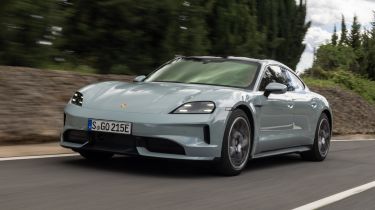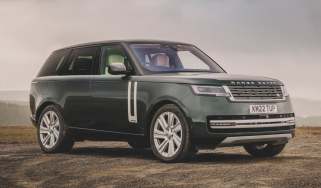Fastest charging electric cars on sale in the UK
There are caveats around maximum charging speeds of electric cars but the quickest charging models will generally help you spend less time hanging about

In many ways electric cars require a change of mindset from motorists who drive them. For instance, with good-old petrol and diesel engines nobody gave a thought to the speed a car was capable of refuelling but with EVs, charging speed has been pushed into sharp focus. It’s not quite as simple as how much juice your EV can suck out of the national grid in a given timeframe but the fastest charging electric cars are generally models that can refuel and get back on the road again more quickly.
When we’re talking about electric car charging there are lots of factors to consider. Manufacturers will quote a maximum charging speed for their cars and that is the highest amount of power in kilowatts that the car is theoretically able to draw from a rapid charger.
It’s theoretical because the charger will also have a maximum possible power output and it may not even be able to deliver that maximum depending on the local electricity supply at the time. If lots of EVs are plugged in at a charging station, for example, you might see charging speeds throttled back. Then there are constraints within the car itself. Factors like the ambient temperature, the battery temperature and the battery’s current state of charge will all impact the speed at which an EV will draw power.
What this means is that the fastest charging electric cars we list below are capable of the faster charging speeds that any other models on sale. The quoted speeds, however, should only be taken as maximum potential speeds because the kind of charging rates actually achievable in the real world, on the UK rapid charging network, are likely to be somewhat slower.
In any case, when you plug into a public rapid charger at a service station or charging hub, the display screen will usually show you exactly what speed your car is charging at. The numbers can fluctuate as the charge progresses, especially as the battery nears capacity and the charging rate automatically slows to protect battery health.
Most manufacturers recommend keeping their electric cars charged to between 10 per cent and 80 per cent to help preserve battery life. Rapid chargers are also recommended mainly as a means of topping up quickly on long journeys, rather than as the default option for every day charging. It’s certainly cheaper to charge at home, or even at a public fast charger, rather than at a high speed rapid charger.
How fast can the fastest charging electric cars charge?
You can work out approximate charging times for electric cars very easily. A car charging at its maximum charging speed of 100kW for one hour could theoretically fill a 100kWh battery, all other things being equal. In reality, the rate of charge would slow significantly after the battery was 80% full. A more likely real world scenario would be adding 25kWh of charge to an EV’s battery in 15 minutes.
If that car was then driven at an average efficiency of 3.5 miles per kilowatt hour (m/kWh) it would have gained just over 87 miles of range from that 15-minute charge. Of course, all of the variables in the charging process mentioned above still apply.
The fastest charging electric cars
Below you’ll find our list of the fastest charging electric cars in sale in the UK ordered by charging speed in kilowatts. Click the links to read the full review of each model…
| Position | Charging speed | Model |
| 1 | 320kW | Porsche Taycan |
| 2 | 270kW | Audi e-tron GT Maserati GranTurismo Folgore Porsche Macan Porsche Taycan Cross Turismo Porsche Taycan Sport Turismo |
| 3 | 250kW | Tesla Model 3 Tesla Model S Tesla Model Y |
| 4 | 240kW | Hyundai Ioniq 5 |
| 5 | 233kW | Genesis Electrified GV70 Genesis GV60 Hyundai Ioniq 6 Kia EV6 |
| 6 | 230kW | Genesis Electrified G80 |
| 7 | 209kW | Kia EV9 |
| 8 | 205kW | BMW i5 Polestar 2 |
| 9 | 200kW | Mercedes EQS Mercedes EQS SUV Volvo C40 Recharge |
| 10 | 195kW | BMW i7 BMW iX |
| 11 | 180kW | BMW i4 |
| 12 | 175kW | Audi Q4 e-tron Cupra Born Skoda Enyaq vRS VW ID.Buzz VW ID.7 |
| 13 | 170kW | Audi Q8 e-tron Mercedes EQE VW ID.3 |
| 14 | 153kW | Volvo EX30 |
What’s the fastest real-world charging speed you’ve managed to achieve in your electric car? Let us know in the comments…



